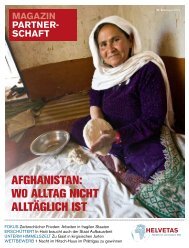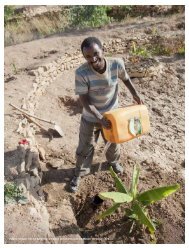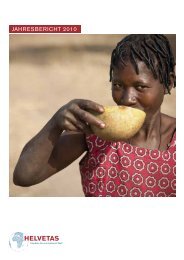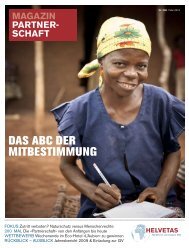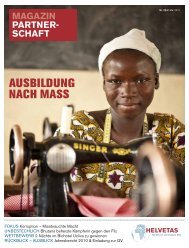Report Feasibility study organic bitter tea Cao Bang - Helvetas
Report Feasibility study organic bitter tea Cao Bang - Helvetas
Report Feasibility study organic bitter tea Cao Bang - Helvetas
You also want an ePaper? Increase the reach of your titles
YUMPU automatically turns print PDFs into web optimized ePapers that Google loves.
<strong>Feasibility</strong> Study Organic Bitter Tea in <strong>Cao</strong> <strong>Bang</strong>: 2007<br />
member states). However, major EU importers are increasingly using more general food<br />
safety regulations, such as EurepGAP.<br />
5.2.2. Japanese <strong>organic</strong> regulations and procedures<br />
Environmentally friendly agriculture (EFA) is a concept used in<br />
Japan. It encompasses more than <strong>organic</strong> agriculture and this, to<br />
some extend, creates some confusion. The total of EFA certified<br />
farms comprises 22 % of all farm households in Japan. In 2002, <strong>organic</strong> farmers accredited<br />
under the Japan Agricultural Standard law represented only 0.7 % of EFA farmers.<br />
Organic regulations took effect in Japan from 2001. The regulation was revised in 2005<br />
and this new regulation became effective on March 01, 2006. Organic production is<br />
regulated as part of the new Japanese Agricultural Standards (JAS) under MAFF.<br />
Standards are very similar to the EU standards, with main exception of the list of permitted<br />
products. One specific, and very important, requirement of JAS is for a "Grading Manager"<br />
who acts as quality assurance manager. Grading means that prior to authorizing the use of<br />
the JAS seal the person in charge (the Grading Manager) checks that for the respective lot<br />
the <strong>organic</strong> standards and internal instructions were followed. The result of this verification<br />
has to be documented in a checklist, which has to be filed during at least one year. Like the<br />
person responsible for production, the grading manager has to attend a JAS seminar, prior<br />
to first JAS inspection (www.ceres-cert.com/en_jas.html, accessed on October 15, 2007).<br />
MAFF officially recognized the equivalence of EU regulation (EEC) 2092/91 with JAS<br />
standards. Due to this agreement on equivalence, JAS certification can be issued without<br />
additional inspection when the operator is already EU certified. (This process is called "recertification").<br />
However, the JAS certificate should be issued by a certifier, which is<br />
accredited by MAFF.<br />
5.2.3. Korean <strong>organic</strong> regulations and procedures<br />
The Korean <strong>organic</strong> labelling system for fresh produce and grains is called<br />
“environmentally friendly” with four variations of an <strong>organic</strong> seal. The first is Organic<br />
(green), Transitional (light green), No Chemicals (blue), and Low Chemicals (orange).<br />
In terms of inspection and certification, there is an important difference whether a raw<br />
material/fresh product or a processed product is being imported into Korea.<br />
Organic raw materials need to be inspected in the country of production by a Korean<br />
inspector, foreign certifications are not accepted. The applying company pays all expenses<br />
for the inspector to travel to the farm. However, the applicant can be the importer and not<br />
necessarily the producer. The certification lasts one year and the time frame to receive<br />
certification is one to two months after the application is received (Llandry, 2004).<br />
- 18 -




